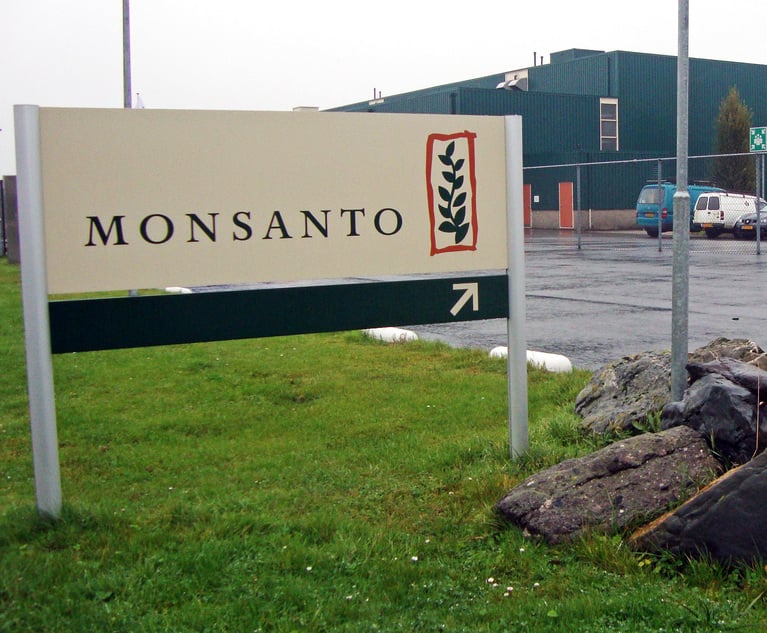How States Are Regulating the Environmental Impacts of a Newly Legalized Industry
This column surveys some of the ways states have chosen to regulate the environmental impacts of cannabis legalization in an effort to understand which issues have been prime targets for regulation, where some regulatory inconsistencies between the states exist, and what may be growing targets for regulation in the future.
January 10, 2019 at 01:52 PM
7 minute read
 Zachary Koslop, Manko Gold Katcher & Fox
Zachary Koslop, Manko Gold Katcher & Fox
Legalized Marijuana
Now legalized in some form in 32 states and the District of Columbia, marijuana is continuing its transition from a niche business in a handful of states to a national industry. Because the federal government still considers marijuana, or cannabis, to be a Schedule I controlled substance under the Controlled Substances Act (CSA), individual states have taken the lead in creating a legal, regulated marketplace for cannabis production and use. To that end, each state may have different goals in regulating the legal marketplace for cannabis, and businesses hoping to operate in or provide services for the newly legalized industry must understand the patchwork of compliance requirements they will face. This column surveys some of the ways states have chosen to regulate the environmental impacts of cannabis legalization in an effort to understand which issues have been prime targets for regulation, where some regulatory inconsistencies between the states exist, and what may be growing targets for regulation in the future.
How States Regulate Cannabis Waste
Perhaps the most universal target of regulation among the legalizing states is the cannabis waste lifecycle. Most states impose specific requirements for the management and disposal of solid cannabis waste. Those requirements include rendering the waste unusable by blending it with noncannabis waste. Many states specify that the resulting blended waste must consist of at least 50 percent noncannabis waste, e.g., 1 Colo. Code Regs. § 212-2.307(E)(1), while other states simply require that the cannabis waste be both unusable and unrecognizable, see e.g., 28 Pa. Code Section 1151.40(b). Nonconsumable, solid wastes with which to blend cannabis waste include paper, plastic, cardboard, food, soil and other wastes, e.g., 3 Alaska Admin. Code tit. 3, Section 306.740(d).
Washington is one of the few states to classify cannabis waste under a different category if the waste, before blending with noncannabis waste, contains 10 percent or greater tetrahydrocannabinol (THC) concentration, which then must be managed as a dangerous waste under state law. On the other hand, for example, Oregon is perhaps more permissive in its approach to cannabis waste disposal by being one of the few states to permit the sale or transfer of cannabis waste between licensees.
After blending the cannabis waste, most states impose requirements on securing and accounting for cannabis waste from its generation to its disposal. California and Colorado are among the majority of states that require cannabis retailers and producers to dispose of cannabis waste in a secured receptacle or secured area, see 1 Colo. Code Regs. Section 212-2.307(G); Cal. Code Regs. tit. 16, §Section 5055(c). In many states it remains unclear as to whether waste haulers, temporary transfer stations, and landfills must also keep cannabis waste secure. At least one state has made clear in an advisory letter that the continued management and security of cannabis waste during transport or while at a transfer station is managed pursuant to the state's existing waste management regulations.
States' regulation of the cannabis waste stream extends to strict recordkeeping. Most states require its licensees to keep comprehensive records of the amount of waste produced, and to include their recordkeeping plan at the license application stage. Some states like Washington have implemented a state traceability system which requires producers or retailers to record and be able to trace the product from seed to disposal. Massachusetts and New York go as far as requiring the retailer to record the date, type, and quantity of waste disposed, the manner and location of disposal, and the signatures of two employees present during the disposal or other handling of the waste.
Consequences of No Federal Involvement
Despite the federal government's relatively hands-off approach to the legalization effort among the states, the federal government's continued classification of cannabis as a Class I controlled substance under the CSA has had trickle-down impacts on cannabis producers and retailers. Some of those impacts may be relatively minor, such as the Bureau of Reclamation prohibiting the use of its contract water for cannabis production. Other impacts may be more localized, as evidenced by anecdotes of compost haulers refusing to accept cannabis waste for fear of violating the CSA.
One of the more meaningful impacts has been the Environmental Protection Agency's (EPA) prohibition on the use of registered pesticides in cannabis cultivation. The EPA has not registered any pesticides for use in cannabis production, despite states like Vermont and Nevada submitting special local needs registrations to use certain tolerance exempt products for cannabis cultivation. Although states have authority to register pesticide products at the state level, states like Massachusetts authorize pesticide use only when the pesticides have been authorized by the EPA, meaning that pesticide use in cannabis production is effectively prohibited in Massachusetts.
The Massachusetts Department of Agricultural Resources recently issued a cease-and-desist order to a cannabis grower who applied unapproved pesticides to its crop, pesticides which, according to the cultivator, were natural compounds approved for use on organic food and approved for use on cannabis by at least four other states. To be sure, some dispensaries are not seeing consistent enforcement of the prohibition, see Dan Adams, “Marijuana dispensary slams state for pesticide bust,” The Boston Globe, Sept. 13, 2018. Other states like Washington, for example, have established their own action levels for certain pesticides. Colorado and California recently mandated testing on cannabis products for the presence of pesticides and other potential contaminants.
Resource Regulation May be Next
As the cannabis industry grows, the targets of regulation may grow along with it. One growing target may be resource consumption—because cannabis cultivation can require a significant amount of water and energy, states are beginning to rein in the industry's resource consumption. The cannabis industry, for example, accounts for nearly 4 percent of Denver's electricity usage. This year Boulder, Colorado passed an ordinance requiring cannabis facilities to report their energy consumption to the city and to offset 100 percent of their consumption with renewable energy use or credits. Massachusetts has restricted the amount of energy used in grow lighting to an average of 36 watts per square foot of cultivation space. The limit effectively forces producers to switch from high-intensity discharge lamps, commonly used in indoor cultivation, to more energy efficient, but perhaps less effective, LED bulbs.
Key Areas to Watch
- Continuing focus on the cannabis waste stream. State regulations generally have been consistent in regulating the cannabis waste stream. Producers and retailers with multi-state operations can standardize their waste stream practices, but should also be aware of certain unique requirements among states.
- Identifying risks and opportunities as waste generation grows. Those producing cannabis waste should have contingency plans in a market where waste transporters may be limited. Those providing waste transporting and disposing services should capitalize on a growing industry and understand the relatively consistent regulatory approach pertaining to the cannabis waste stream.
- Maintaining flexible production strategies. Acceptable pesticides and types of lighting may vary from state to state. Other states may continue to implement restrictions on resources used in producing cannabis.
- Keeping an eye on federal involvement. For now, the federal government has been relatively uninvolved with the environmental impacts of the industry. If the legal landscape changes at the federal level, or if environmental impacts become more significant, the federal government may take a different regulatory approach.
Zachary J. Koslap is an attorney at the environmental, energy and land use law and litigation firm Manko Gold Katcher & Fox. He concentrates his practice in regulatory compliance and transactional matters, and can be reached at 484-430-2330 or [email protected].
This content has been archived. It is available through our partners, LexisNexis® and Bloomberg Law.
To view this content, please continue to their sites.
Not a Lexis Subscriber?
Subscribe Now
Not a Bloomberg Law Subscriber?
Subscribe Now
NOT FOR REPRINT
© 2025 ALM Global, LLC, All Rights Reserved. Request academic re-use from www.copyright.com. All other uses, submit a request to [email protected]. For more information visit Asset & Logo Licensing.
You Might Like
View All

'Close Our Borders?' Senate Judiciary Committee Examines Economics, Legal Predicate for Mass Deportation Proposal
3 minute read
'Serious Misconduct' From Monsanto Lawyer Prompts Mistrial in Chicago Roundup Case
3 minute read
Monsanto Scores 2nd Phila. Roundup Verdict, but Fails to Stop Impending Trial
3 minute readTrending Stories
Who Got The Work
Michael G. Bongiorno, Andrew Scott Dulberg and Elizabeth E. Driscoll from Wilmer Cutler Pickering Hale and Dorr have stepped in to represent Symbotic Inc., an A.I.-enabled technology platform that focuses on increasing supply chain efficiency, and other defendants in a pending shareholder derivative lawsuit. The case, filed Oct. 2 in Massachusetts District Court by the Brown Law Firm on behalf of Stephen Austen, accuses certain officers and directors of misleading investors in regard to Symbotic's potential for margin growth by failing to disclose that the company was not equipped to timely deploy its systems or manage expenses through project delays. The case, assigned to U.S. District Judge Nathaniel M. Gorton, is 1:24-cv-12522, Austen v. Cohen et al.
Who Got The Work
Edmund Polubinski and Marie Killmond of Davis Polk & Wardwell have entered appearances for data platform software development company MongoDB and other defendants in a pending shareholder derivative lawsuit. The action, filed Oct. 7 in New York Southern District Court by the Brown Law Firm, accuses the company's directors and/or officers of falsely expressing confidence in the company’s restructuring of its sales incentive plan and downplaying the severity of decreases in its upfront commitments. The case is 1:24-cv-07594, Roy v. Ittycheria et al.
Who Got The Work
Amy O. Bruchs and Kurt F. Ellison of Michael Best & Friedrich have entered appearances for Epic Systems Corp. in a pending employment discrimination lawsuit. The suit was filed Sept. 7 in Wisconsin Western District Court by Levine Eisberner LLC and Siri & Glimstad on behalf of a project manager who claims that he was wrongfully terminated after applying for a religious exemption to the defendant's COVID-19 vaccine mandate. The case, assigned to U.S. Magistrate Judge Anita Marie Boor, is 3:24-cv-00630, Secker, Nathan v. Epic Systems Corporation.
Who Got The Work
David X. Sullivan, Thomas J. Finn and Gregory A. Hall from McCarter & English have entered appearances for Sunrun Installation Services in a pending civil rights lawsuit. The complaint was filed Sept. 4 in Connecticut District Court by attorney Robert M. Berke on behalf of former employee George Edward Steins, who was arrested and charged with employing an unregistered home improvement salesperson. The complaint alleges that had Sunrun informed the Connecticut Department of Consumer Protection that the plaintiff's employment had ended in 2017 and that he no longer held Sunrun's home improvement contractor license, he would not have been hit with charges, which were dismissed in May 2024. The case, assigned to U.S. District Judge Jeffrey A. Meyer, is 3:24-cv-01423, Steins v. Sunrun, Inc. et al.
Who Got The Work
Greenberg Traurig shareholder Joshua L. Raskin has entered an appearance for boohoo.com UK Ltd. in a pending patent infringement lawsuit. The suit, filed Sept. 3 in Texas Eastern District Court by Rozier Hardt McDonough on behalf of Alto Dynamics, asserts five patents related to an online shopping platform. The case, assigned to U.S. District Judge Rodney Gilstrap, is 2:24-cv-00719, Alto Dynamics, LLC v. boohoo.com UK Limited.
Featured Firms
Law Offices of Gary Martin Hays & Associates, P.C.
(470) 294-1674
Law Offices of Mark E. Salomone
(857) 444-6468
Smith & Hassler
(713) 739-1250





